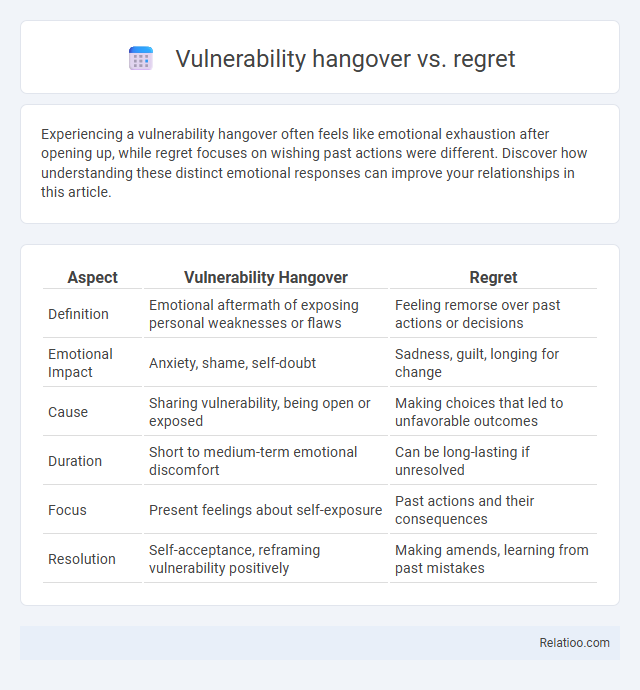Experiencing a vulnerability hangover often feels like emotional exhaustion after opening up, while regret focuses on wishing past actions were different. Discover how understanding these distinct emotional responses can improve your relationships in this article.
Table of Comparison
| Aspect | Vulnerability Hangover | Regret |
|---|---|---|
| Definition | Emotional aftermath of exposing personal weaknesses or flaws | Feeling remorse over past actions or decisions |
| Emotional Impact | Anxiety, shame, self-doubt | Sadness, guilt, longing for change |
| Cause | Sharing vulnerability, being open or exposed | Making choices that led to unfavorable outcomes |
| Duration | Short to medium-term emotional discomfort | Can be long-lasting if unresolved |
| Focus | Present feelings about self-exposure | Past actions and their consequences |
| Resolution | Self-acceptance, reframing vulnerability positively | Making amends, learning from past mistakes |
Understanding Vulnerability Hangover
Understanding vulnerability hangover involves recognizing the emotional aftermath of exposing your true self, which can include feelings of regret, shame, or self-doubt. Unlike regret, which centers on wishing you had acted differently, vulnerability hangover captures the lingering discomfort from taking emotional risks. You can manage this experience by practicing self-compassion and reframing vulnerability as a strength rather than a source of weakness.
What Is Regret?
Regret is a complex emotional response that occurs after making a decision or taking an action that results in an unfavorable outcome, often accompanied by feelings of guilt, disappointment, or remorse. Unlike a vulnerability hangover, which stems from the discomfort or embarrassment following emotional exposure, regret is tied specifically to reflecting on past choices and wishing they had been different. Understanding regret involves recognizing its impact on decision-making and emotional well-being, as it can drive learning or lead to negative rumination.
Key Differences: Vulnerability Hangover vs Regret
Vulnerability hangover is the emotional aftermath of exposing your true self and feeling unsettled or anxious about potential judgment, whereas regret centers on wishing you had made a different choice or action. Key differences lie in their origins: vulnerability hangover stems from self-disclosure and emotional risk, while regret arises from perceived mistakes or missed opportunities. Understanding these distinctions helps you manage emotional responses and build resilience in personal growth.
Psychological Roots of Vulnerability Hangover
Vulnerability hangover stems from the psychological roots of shame, fear of judgment, and perceived loss of control after sharing deeply personal information. It differs from regret, which involves remorse over choices or actions, and from the vulnerability hangover itself, which specifically centers on emotional aftermath linked to exposure and perceived vulnerability. Understanding the cognitive patterns and emotional triggers helps distinguish vulnerability hangover from related psychological experiences like regret.
How Regret Manifests Emotionally
Regret manifests emotionally through feelings of guilt, shame, and persistent sadness, often stemming from decisions made during moments of vulnerability hangover, where emotional exhaustion leads to poor choices. Unlike vulnerability hangover, which primarily involves emotional fatigue and overwhelm after exposing one's true self, regret intensifies by fixating on past actions and wishing for different outcomes. Recognizing these emotional patterns helps differentiate between the transient state of vulnerability hangover and the deeper, lingering emotional impact of regret.
Common Triggers for Vulnerability Hangover
Common triggers for vulnerability hangover include oversharing personal information, receiving unexpected criticism, or feeling exposed after expressing true emotions. These situations can cause emotional exhaustion, self-doubt, and second-guessing your openness. Recognizing triggers helps you manage vulnerability hangover and prevent regret from undermining your personal growth.
Impact of Regret on Decision-Making
Regret significantly influences decision-making by increasing hesitation and risk aversion, often leading individuals to avoid choices that previously resulted in negative outcomes. Vulnerability hangover, the emotional aftermath of exposing one's authentic self and facing judgment, differs as it primarily impacts confidence and willingness to be open rather than risk-taking behavior. While both regret and vulnerability hangover affect emotional states, regret's cognitive burden more directly alters future decisions by fostering caution and second-guessing.
Coping Strategies for Vulnerability Hangover
Vulnerability hangover involves feelings of shame or embarrassment after sharing personal truths, whereas regret stems from wishing you hadn't disclosed certain information. Coping strategies for vulnerability hangover include practicing self-compassion, reframing negative thoughts, and seeking social support to normalize your experience. Your ability to embrace vulnerability without harsh judgment leads to stronger emotional resilience and healthier relationships.
Healthy Ways to Process Regret
Vulnerability hangover occurs when feeling exposed after sharing deeply personal information, often causing shame or insecurity that exacerbates emotional distress. Regret involves reflecting on past decisions with a desire to change outcomes, which can lead to rumination if not managed properly. Healthy ways to process regret include practicing self-compassion, reframing mistakes as learning opportunities, and engaging in mindfulness techniques to reduce negative self-judgment and build emotional resilience.
Growth Opportunities in Vulnerability and Regret
Vulnerability hangover often involves lingering feelings of exposure and shame after showing true emotions, whereas regret centers on wishing to undo past actions or choices. Growth opportunities arise in vulnerability by embracing discomfort to foster deeper connections and self-awareness, while regret prompts reflection that can guide improved decision-making and personal development. Both states, when navigated mindfully, enhance emotional resilience and promote transformative learning experiences.

Infographic: Vulnerability hangover vs regret
 relatioo.com
relatioo.com